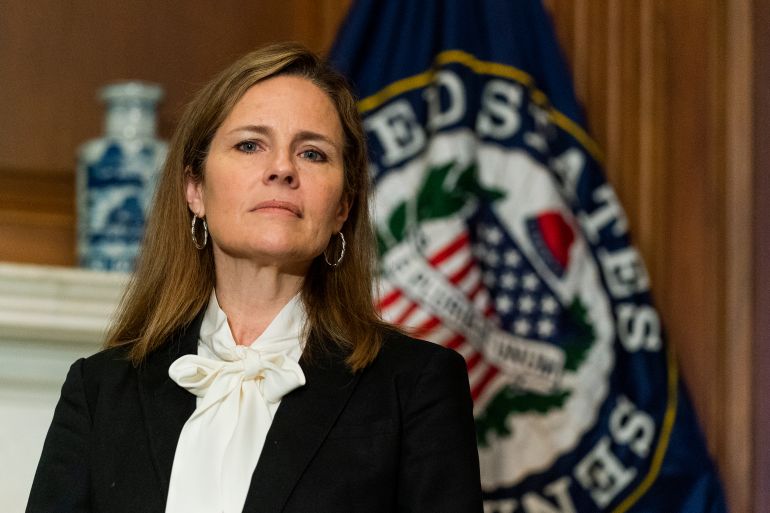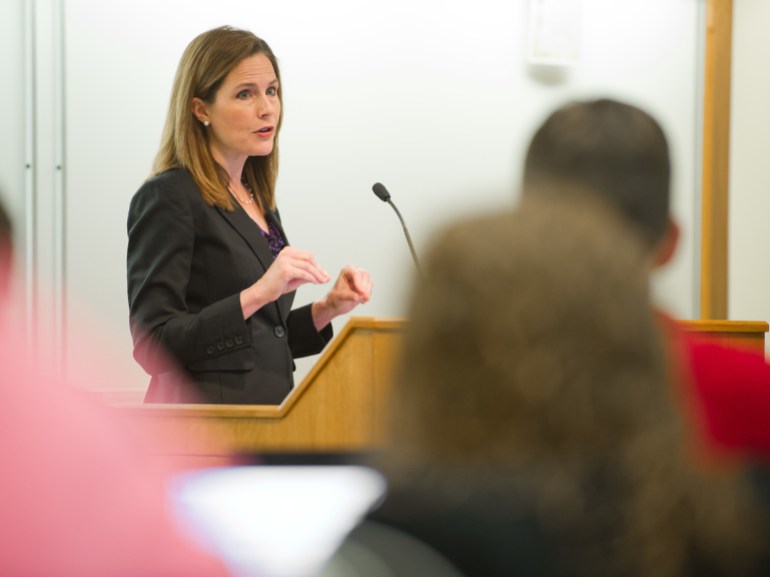What to know about Amy Coney Barrett as she faces Senate scrutiny
President Donald Trump’s choice for the Supreme Court is well-respected but viewed sceptically by Democrats.

Washington, DC – US President Donald Trump’s nominee to the Supreme Court Amy Coney Barrett is a federal appeals court judge who would swing the United States’ high court firmly to the right in a new 6-3 conservative majority.
Barrett, 48, is known in conservative legal circles as a brilliant academic with a sharp legal mind.
Keep reading
list of 4 itemsTrump ally Rudy Giuliani files for bankruptcy following defamation case
‘Insurrection’ should bar Donald Trump from US presidency, lawyers argue
Ex-Proud Boys leader Joseph Biggs sentenced to 17 years for US Capitol riot
Her legal record and personal religious views are coming under harsh scrutiny as her confirmation hearings begin in the US Senate amid a battle between President Trump and his Democratic challenger Joe Biden for control of the White House.
With Trump trailing in the polls, Republicans are trying to expedite Barrett’s confirmation through the Senate before the election. Democrats say the winner of the election should be the one to choose a replacement to Justice Ruth Bader Ginsberg who died of cancer on September 18.
Barrett is a disciple of a relatively new school of constitutional jurisprudence called “originalism”, in which scholars and judges interpret the original intent of the framers of the US constitution as well as the meaning of their words.
At the same time, Barrett is a practising Catholic and a member of People of Praise, a charismatic Christian group that adheres to a traditional covenant. She brings a faith-based aspect to her conservative principles that is both troubling and difficult for Democrats to challenge.
Republicans will seek to position Democrats’ opposition to Barrett as antipathy towards her Catholic religion. Democrats have signalled they will avoid criticising her religious beliefs while keeping the focus on policy.
Democrats fear that Barrett would vote with other conservatives on the court to dismantle the landmark Obamacare law providing access to health insurance for millions of Americans and roll back prior rulings that established a woman’s right to an abortion.
Barrett personally opposes abortion, although she sidestepped questions about the topic in her 2017 Senate confirmation hearing. The landmark 1973 Supreme Court case Roe v Wade established a woman’s right to an abortion and that right has been affirmed by subsequent rulings.
Barrett came to national prominence in 2017 when she was pulled from her post as a law professor at the University of Notre Dame and named to the US Court of Appeals for the Seventh Circuit.

Barrett had never served as a judge before Trump nominated her to the appeals court, a significant position in the US judiciary. The Seventh Circuit hears cases arising from seven federal court districts in Illinois, Indiana and Wisconsin, three states in the American Midwest.
That combination of academic and appellate work put Barrett on a fast track to the US Supreme Court. When Trump nominated Justice Brett Kavanaugh for a seat in 2018, Barrett was already on his shortlist of candidates.
“She has the intellectual firepower to hold her own … with the best of the others on the court,” said Randy Barnett, a constitutional law scholar at Georgetown University. Barrett “is knowledgeable” about US constitutional theory “as evidenced by her writings as a constitutional law professor”, Barnett told Al Jazeera
Barrett is a graduate of Notre Dame Law School, where she was editor of the law review and finished first in her class in 1997.
She clerked at the US Court of Appeals for the DC Circuit and then the Supreme Court after law school. She also practised law at a private firm in Washington, DC, for three years before returning to Notre Dame in 2002 to teach.
Barnett’s affiliation with conservative Supreme Court Justice Antonin Scalia and her academic writings made her a darling of the right-wing Federalist Society, a group that has funnelled more than 200 conservative jurists to the federal courts under President Trump.
On Saturday, Barrett said Scalia’s “judicial philosophy” was hers as well. “Judges must apply the law as written. Judges are not policymakers,” she said.
‘Sincere’ person
But there are signs – at least among legal experts – that the tone may be more civil than the 2018 controversy over Kavanaugh’s confirmation, an admittedly low standard.
Harvard Law School professor Noah Feldman, a liberal constitutional scholar who advocated for Trump’s impeachment before the House Judiciary Committee, wrote in a Bloomberg opinion article that Barrett has the qualifications to be on the Supreme Court.
“I got to know Barrett more than 20 years ago when we clerked at the Supreme Court during the 1998-99 term. Of the 30-some clerks that year, all of whom had graduated at the top of their law school classes and done prestigious appellate clerkships before coming to work at the court, Barrett stood out,” Feldman wrote.
“To add to her merits, Barrett is a sincere, lovely person. I never heard her utter a word that wasn’t thoughtful and kind – including in the heat of real disagreement about important subjects. She will be an ideal colleague,” he said.
